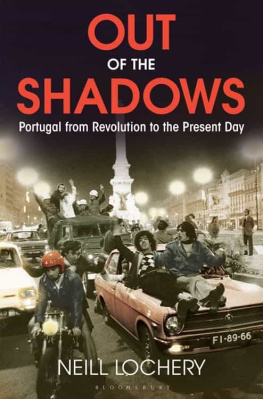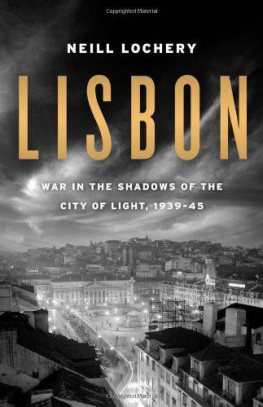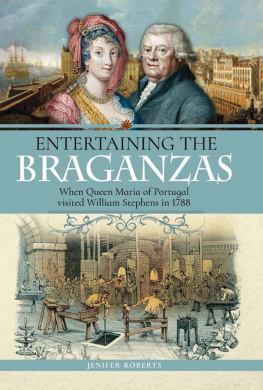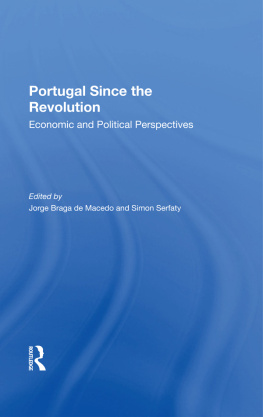OUT OF THE SHADOWS
For Emma, Benjamin and Hlna with love
The Resistible Rise of Benjamin Netanyahu
Brazil: Fortunes of War: WWII and the Making of Modern Brazil
Lisbon: War in the Shadows of the City of Light, 19391945
Why Blame Israel?
Loaded Dice: The Foreign Office and Israel
The View from the Fence: The Arab-Israeli Conflict from the Present to Its Roots
More information on Neill Lochery is available on his website, which includes details of his books and articles.
www.neill-lochery.com
OUT OF THE
SHADOWS
Portugal from Revolution
to the Present Day
NEILL LOCHERY

Contents
Lisbon and Portugals best days are behind them is a common theme put forward by writers who focus their attentions on the golden eras of the Portuguese discoverers, the Empire and the role of Lisbon as a major Atlantic power. In writing this book about the first 40 years of post-authoritarian democratic Portugal, following the 25 April Revolution in 1974, I have tried to keep an open mind about the political and economic difficulties that have blighted the countrys development since 1974.
In doing this, I do not accept that the country is suffering from an inevitable decline, or that its current status as the poor man of Europe is permanent. Instead, I have tried to focus on the themes that run throughout the four decades of democracy that help explain why the present-day Portugal is struggling to find its place in Europe, the wider world and the global economy. Many of the mistakes that have been made since 1974 have been repeated over and over again by political leaders from both the major parties, with their preference for short-term fix over long-term meaningful reform.
From the outset, it was clear to me that this was not simply going to be a book about Portugal. One of the major failings in understanding the post-Revolution era has been the over-concentration on domestic over international factors in helping shape its story.
Even during the period of the authoritarian Estado Novo from 1933 to 1974, when Portugal was largely cut off from the outside world, relations with the United States, Great Britain and the rest of Europe were important in shaping the domestic narrative. International wars have also been central to the development of Portugal: the First World War, the Second World War and the Cold War all had implications, good and bad, for the country.
The Portuguese Revolution, and the resulting fight to establish a democratic state, did not take place in isolation from the international world. The reasons for the Revolution might very well have been domestically motivated, but the consequences of its outcome most certainly did not stop at Portugals borders. The Revolution took place at the height of the Cold War, less than a year after the 1973 Arab-Israeli War, and at the same time that the United States was slowly losing a war in Vietnam.
It also came in an era when the United States and the Soviet Union sat at the top of a bipolar international system in which they competed for clients and influence. Neither the United States nor the Soviet Union were going to stand idly by and watch the post-Revolution struggle in Portugal simply as bystanders.
The United States, in particular, viewed the Revolution as a strategic threat to its interests in Europe, both in terms of the risk of losing Portugal to the Soviet Union, and in the potential domino effect of this on the rest of Southern and Western Europe. So a central theme in my book highlights foreign influences on the Portuguese story, starting with the response of the United States and the Western powers to the Revolution and the struggle between democracy and communism that defined the first stage of the post-Revolution era.
In outlining the events of 25 April 1974 from an international perspective, I have been lucky enough to make use of papers recently declassified in the National Archives of the United States and Great Britain. By piecing together the material it has been possible to create a narrative that illustrates the initially confused nature of the responses to developments in Lisbon. It highlights the deep divisions in the administration of President Richard Nixon over the best course of action to take to ensure that Portugal did not turn red.
The rest of the book follows a similar pattern, by using documentary sources to portray the development of Portugal in an international context from the Revolution, to European Community (EC) membership, to the bailout, and beyond. Portugals long and winding road to EC membership served as another key example of the role of external powers in shaping the Portuguese narrative. Many European leaders were initially, at best, nervous at letting Portugal, and the two other poor states of Europe (Greece and Spain), join what was known as the rich club of Europe.
It was only after thorny, protracted negotiations that the three were allowed to join. Portuguese proposed entry was tied up for a long time in debates about EU enlargement and the complex Spanish-EU negotiations. In other words, the story of Portugals accession was not a stand-alone narrative. The intention has been to avoid producing a book that merely revisits old ground in modern Portuguese history: rather it tries to add something new, and more three-dimensional, to contemporary Portuguese history.
The writing of modern history produces unique challenges for the historian. Most democratic countries have what is known as the 30-year rule. During this period documents are locked away from the public, and this makes it difficult to obtain the information needed to produce a meaningful account of events that took place from 30 years ago to the present day. This problem often prevents historians from attempting to write major historical works until at least 30 years have passed, and the documents have been declassified and released in the respective national archives.
In writing this book, however, I navigated around this problem by requesting specific British diplomatic papers under the Freedom of Information Act (FIA). I was fortunate enough to be able to obtain the release of the documents that I requested, and it is those documents that are used in this book. The quality of these papers, and the new light they cast on key events, personalities and economic issues, have made this book a great pleasure to write. For me, it was akin to learning a new story that, at times, ran parallel to the one I knew, and at other points took the narrative off into completely new and previously uncharted territory.
Two points of caution need to be noted here: first, there are still more documents that need to be released in order to obtain a complete picture of some of the key events. For example, when the United States Secretary of State, Henry Kissinger, promised to turn Portugal into the next Chile (where the CIA had effectively plotted the overthrow of the government), how serious was his intent? Was he merely having a temper tantrum, as he often did while under great stress, or was he deadly serious? Or did other members of the Nixon administration, and the US intelligence service, talk Kissinger out of following a regime change strategy for Portugal? Key CIA files on this area remain locked away, with only a selective range of documents being released.
Secondly, there is always the possibility that documents from foreign sources that make assessments about Portugal might turn out to be inaccurate in their analysis, or simply misinformed. Having spent a great deal of time perusing the documents from the United States and Great Britain on the period immediately preceding the 25 April Revolution, I see that neither country had any real understanding of the political temperature in Lisbon.
Next page












